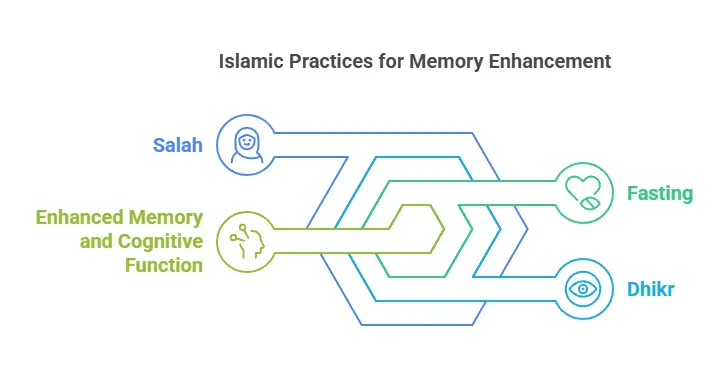
This article investigates the most effective Dua to improve memory improvement that draw upon both Islamic teachings and scientific research.
This guide will offer students who need better retention strategies as well as professionals who require mental clarity and people who want to enhance their memories practical tips and spiritual practices along with powerful prayers to help you reach your objectives.
We will teach you how to strengthen your memory with the help of Quranic verses and Prophetic traditions.
Top Dua to Improve Memory
The Quran and Hadith provide specific duas that Muslims can recite to enhance their memory, gain clarity, and retain knowledge.
Below, we explore four of the most effective duas for memory improvement, their meanings, and how to incorporate them into your daily routine.
Dua for Seeking Knowledge (Rabbi Zidni Ilma)
One of the most well-known duas for seeking knowledge and improving memory is “Rabbi Zidni Ilma” (رَبِّ زِدْنِي عِلْمًا), which translates to “My Lord, increase me in knowledge.” This dua is derived from Surah Ta-Ha (20:114), where Allah instructs the Prophet Muhammad (PBUH) to seek an increase in knowledge.
- Why This Dua is Powerful:
This dua is a humble request to Allah for an increase in beneficial knowledge. It acknowledges that all knowledge comes from Allah and that He is the ultimate source of wisdom and understanding. - When to Recite:
- Before starting a study session or attending a class.
- During Tahajjud (night prayer) for maximum sincerity and focus.
- After completing Salah (prayer) to seek Allah’s blessings on your efforts.
- Example of Usage:
A student preparing for exams might recite this dua repeatedly, asking Allah to help them understand and retain the material they are studying.
Dua for Clarity and Understanding (Allahumma Inni As’aluka Ilman Nafi’a)
Another powerful dua for memory improvement is “Allahumma inni as’aluka ilman nafi’a” (اللهم إني أسألك علما نافعا), which means “O Allah, I ask You for beneficial knowledge.” This dua emphasizes the importance of seeking knowledge that is useful and beneficial in both this life and the Hereafter.
- Why This Dua is Powerful:
It focuses on asking Allah for knowledge that will benefit you spiritually, intellectually, and practically. It also serves as a reminder to avoid useless or harmful information. - When to Recite:
- Before engaging in any learning activity, such as reading, attending lectures, or researching.
- During moments of confusion or mental fog, to seek clarity and understanding.
- Example of Usage:
A professional facing a complex problem at work might recite this dua to gain the insight and clarity needed to find a solution.
Dua for Retaining Knowledge (Allahumma Infa’ni Bima Allamtani)
The dua “Allahumma infa’ni bima allamtani” (اللهم انفعني بما علمتني) translates to “O Allah, benefit me with what You have taught me.” This supplication is a request for Allah to make the knowledge you have acquired beneficial and to help you retain it.
- Why This Dua is Powerful:
It acknowledges that knowledge is a gift from Allah and asks Him to ensure that this knowledge is retained and applied in a way that benefits you and others. - When to Recite:
- After completing a study session or learning something new.
- Before going to sleep, to help consolidate what you’ve learned during the day.
- Example of Usage:
A teacher might recite this dua after preparing a lesson, asking Allah to help them remember and effectively convey the information to their students.
Dua for Removing Forgetfulness (Allahumma Innī A’ūdhu Bika Min Al-Hammi Wa Al-Ḥuzni)
For those struggling with forgetfulness, the dua “Allahumma innī a’ūdhu bika min al-hammi wa al-ḥuzni” (اللهم إني أعوذ بك من الهم والحزن) is highly recommended. It means “O Allah, I seek refuge in You from anxiety and grief.” While this dua is often recited for emotional relief, it also helps in improving memory by reducing stress and mental distractions.
- Why This Dua is Powerful:
Stress and anxiety are major contributors to forgetfulness. By seeking refuge in Allah from these emotional burdens, you create a calmer mental state, which is conducive to better memory retention. - When to Recite:
- During times of stress or when feeling overwhelmed.
- Before starting a task that requires focus and concentration.
- Example of Usage:
A person preparing for an important presentation might recite this dua to calm their nerves and improve their ability to recall information.
By incorporating these powerful duas into your daily life, you can seek Allah’s help in improving your memory, gaining clarity, and retaining knowledge.
Remember, dua is not just a request—it’s a form of worship that strengthens your connection with Allah and reminds you of His infinite wisdom and mercy.





